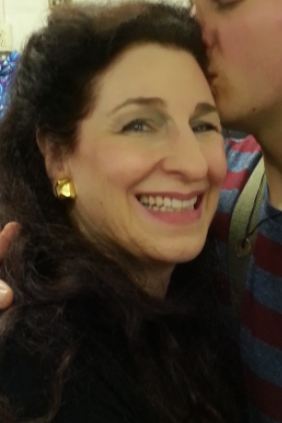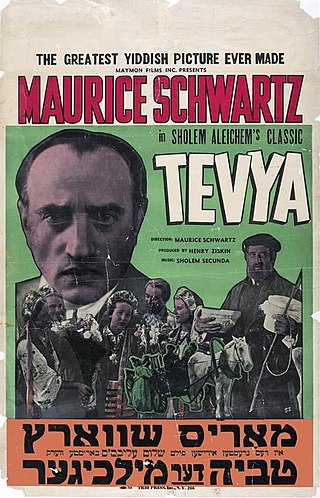Related Research Articles

Chaim Topol, mononymously known as Topol, was an Israeli actor, singer, and illustrator. He is best known for his portrayal of Tevye, the lead role in the stage musical Fiddler on the Roof and the 1971 film adaptation, performing this role more than 3,500 times from 1967 through 2009.

Tevye the Dairyman, also translated as Tevye the Milkman is the fictional narrator and protagonist of a series of short stories by Sholem Aleichem, and their various adaptations, the most famous being the 1964 stage musical Fiddler on the Roof and its 1971 film adaptation. Tevye is a pious Jewish dairyman living in the Russian Empire, the patriarch of a family including several troublesome daughters. The village of Boyberik, where the stories are set, is based on the town of Boyarka, Ukraine, then part of the Russian Empire. Boyberik is a suburb of Yehupetz, where most of Tevye's customers live.

Fiddler on the Roof is a musical with music by Jerry Bock, lyrics by Sheldon Harnick, and book by Joseph Stein, set in the Pale of Settlement of Imperial Russia in or around 1905. It is based on Tevye and his Daughters and other tales by Sholem Aleichem. The story centers on Tevye, a milkman in the village of Anatevka, who attempts to maintain his Jewish religious and cultural traditions as outside influences encroach upon his family's lives. He must cope with the strong-willed actions of his three older daughters who wish to marry for love; their choices of husbands are successively less palatable for Tevye. An edict of the tsar eventually evicts the Jews from their village.

Solomon Naumovich Rabinovich, better known under his pen name Sholem Aleichem, was a Yiddish author and playwright who lived in the Russian Empire and in the United States. The 1964 musical Fiddler on the Roof, based on Aleichem's stories about Tevye the Dairyman, was the first commercially successful English-language stage production about Jewish life in Eastern Europe.

Samuel Joel "Zero" Mostel was an American actor, comedian, and singer. He is best known for his portrayal of comic characters such as Tevye on stage in Fiddler on the Roof, Pseudolus on stage and on screen in A Funny Thing Happened on the Way to the Forum, and Max Bialystock in the original film version of Mel Brooks' The Producers (1967). Mostel was a student of Don Richardson, and he used an acting technique based on muscle memory. He was blacklisted during the 1950s; his testimony before the House Un-American Activities Committee was well publicized. Mostel later starred in the Hollywood Blacklist drama film The Front (1976) alongside Woody Allen, for which Mostel was nominated for the British Academy Film Award for Best Supporting Actor.

Rosalind Harris is an American theater and film actress. She is best known for her portrayal of Tzeitel, the eldest daughter of Tevye, in the 1971 film version of Fiddler on the Roof. She also starred as Tzeitel in the Broadway musical, having replaced Bette Midler. Nearly 20 years after the film, Harris played mother Golde in a touring stage revival of Fiddler on the Roof; Topol, the Israeli actor who played her father Tevye in the film, reprised his role, now playing her husband.

Tevya is a 1939 American Yiddish film, based on author Sholem Aleichem's stock character Tevye the Dairyman, also the subject of the 1964 musical Fiddler on the Roof. It was the first non-English language picture selected for preservation by the National Film Registry.

A kashket is a cap, usually made of felt, worn mainly by Hasidic Jewish children as an alternative to the kippah. It has a crown, a band and peak. From the beginning of the 20th century until World War II, many Russian Jews and Polish Jews wore this cap as part of their everyday dress.

Fiddler on the Roof is a 1971 American period musical film produced and directed by Norman Jewison from a screenplay written by Joseph Stein, based on the 1964 stage musical of the same name by Stein, Jerry Bock, and Sheldon Harnick. Set in early 20th-century Imperial Russia, the film centers on Tevye, played by Topol, a poor Jewish milkman who is faced with the challenge of marrying off his five daughters amidst the growing tension in his shtetl. The cast also features Norma Crane, Leonard Frey, Molly Picon, Paul Mann, Rosalind Harris, Michèle Marsh, Neva Small and Paul Michael Glaser. The musical score, composed by Bock with lyrics by Harnick, was adapted and conducted by John Williams.

Tevye and His Seven Daughters is a 1968 Israeli drama film directed by Menahem Golan. Based on stories by Sholem Aleichem, which were also the basis for the stage musical and 1971 film, both titled Fiddler on the Roof.
"Do You Love Me?" is a song from the 1964 musical Fiddler on the Roof. It is performed by Tevye and his wife Golde.
"Sunrise, Sunset" is a song from the musical Fiddler on the Roof written in 1964 by composer Jerry Bock and lyricist Sheldon Harnick.

Shmuel Rodensky was a Russian-born Israeli actor whose stage, film, and television career in Israel and West Germany spanned six decades. He immigrated to Mandatory Palestine in 1924 and studied drama at the Eretz Israel Theatre in Tel Aviv. After performing with several theatre companies between 1928 and 1948, he joined Habima Theatre in 1949 and became one of its principal players. He was known as "the Israeli Laurence Olivier". In 1968 Rodensky traveled to Hamburg to join the German-language production of Fiddler on the Roof, playing the lead role of Tevye the Dairyman. He performed this role more than 1,400 times throughout West Germany and Switzerland. His notable film roles include the lead in the 1968 Israeli film Tevye and His Seven Daughters, Simon Wiesenthal in the 1974 Anglo-German film The Odessa File, and Jethro in the 1974 BBC television miniseries Moses the Lawgiver. He was the recipient of numerous honors in both Israel and West Germany, including the Federal Service Cross from the Federal Republic of Germany and the Israel Prize.
Green Violinist is a 1923–24 painting by artist Marc Chagall that is now in the permanent collection of the Solomon R. Guggenheim Museum in New York City. The work depicts a fiddler as the central figure who appears to be floating or dancing above the much smaller rooftops of the misty gray village below. This work is often considered to be the inspiration for the title of the 1964 musical Fiddler on the Roof.

Broken Barriers, also known as Khava is a 1919 American Yiddish silent film, based on author Sholem Aleichem's stock character Tevye the Dairyman.

Fiddler: A Miracle of Miracles is a 2019 American documentary film about the creation and significance of the 1964 musical Fiddler on the Roof. Directed by Max Lewkowicz, it features interviews with Fiddler creators such as Jerry Bock, Sheldon Harnick, Joseph Stein, and Harold Prince, as well as scholars, actors, and other musical theatre figures such as Stephen Sondheim and Lin-Manuel Miranda. The documentary includes rarely-seen footage of the original Broadway cast as well as interviews with creators, actors, theatrical figures, and scholars.

Sholem Aleichem: Laughing in the Darkness is an American biographical documentary film about Yiddish writer Sholem Aleichem, who is best known for his stories about Tevye the Dairyman, the basis for the musical Fiddler on the Roof. The film uses historical photographs, film, and audio, as well as analysis by scholars and excerpts from his work read in Yiddish, to document the writer's life and the shtetl and Lower East Side lifestyles that influenced him. It was released on 8 July 2011 to positive reviews, and is one of only a small number of works with a 100% rating at the review aggregator Rotten Tomatoes.
Kasrilevka or Kasrilevke is a fictional shtetl introduced by a Yiddish author Sholem Aleichem. Located "exactly in the middle of that blessed Pale", it is an idealized town of "little Jews", who met their misfortunes with humor and the ultimate belief in justice. It has become an archetype shtetl. Other famous imaginary places of Sholem Aleichem are Yehupetz and Boiberik.
Menahem-Mendl is a series of stories and in Yiddish by Sholem Aleichem about hilarious exploits of an optimistic shlemiel Menahem-Mendl, who dreams of getting rich. They are presented as an exchange of letters between him and his ever-scolding wife Sheyne-Shendl, and later published as epistolary novels.
Yehupetz is a fictional town in the Russian Empire, a portrayal of Kyiv in Sholem Aleichem stories. It is a transitional place between the classical shtetl and a modern city.
References
- 1 2 "Fiddler On The Roof - Tradition Lyrics". www.lyricsmania.com.
- ↑ Tevye's Daughters, by Sholom Aleichem, translated by Frances Butwin (1949). "The Bubble Bursts" appears on pages 1–15, "If I Were Rothschild" on pages 16–19.
- ↑ Hischak, Thomas (2008). The Oxford Companion to the American Musical. Oxford University Press. ISBN 9780195335330.
- ↑ Swain, Joseph (2002). The Broadway Musical: A Critical and Musical Survey. Scarecrow Press. ISBN 9781461664079.
- ↑ Wolitz, Seth (2006). Cornis-Pope, Marcel; Neubauer, John (eds.). Ashkenaz or the Jewish Presence in East-Central Europe. ISBN 9789027293404.
{{cite book}}:|work=ignored (help) - ↑ Fogarty, Mignon (27 October 2009). The Grammar Devotional. St. Martin's Publishing. ISBN 9781429964401.
- ↑ Knight, Professor Arthur; Wojcik, Pamela Robertson; Knight, Arthur (3 December 2001). Soundtrack Available. Duke University Press. ISBN 0822328003.
- ↑ "tefilla - Meaning of "bidi-bidi-bum" - Mi Yodeya". stackexchange.com.
- ↑ "'Fiddler' Composer Jerry Bock, 1928–2010". NPR.org. 5 November 2010.
- ↑ Nimmervoll, Ed (6 September 1967). "National Top 40". Go-Set . Waverley Press. Retrieved 29 March 2014.
- ↑ Rice, Tim; Rice, Jo; Gambaccini, Paul; Read, Mike (1985). Guinness British Hit Singles (5th ed.). Guinness Superlatives Limited. ISBN 0-85112-429-1.
- ↑ Vineyard, Jennifer (2004). "Gwen Stefani: Scared Solo". MTV. p. 3. Archived from the original on 1 December 2008. Retrieved 4 February 2016.
- ↑ Kamien, Adam (15 December 2009). "Yidcore's final countdown". The Times of Israel. Retrieved 19 November 2021.
- ↑ David Serero - Ah! Si J'étais Riche. YouTube. 5 August 2014.[ dead YouTube link ]
- ↑ Friedman, Gabe (16 January 2021). "Flo Milli samples 'If I Were a Rich Man' in new track". The Times of Israel. Retrieved 28 December 2021.